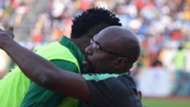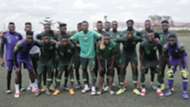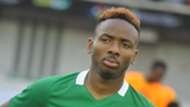
Imama Amapakabo’s side stumbled out of the reckoning for next year’s Tokyo Games, leaving behind many difficult questions
The last time Nigeria made back-to-back appearances in the football competition at the Olympic Games was in 2000. That unwanted record, which has seen Nigeria alternate between editions – one on, one off – will now continue into the 2020s.
The reaction to this latest footballing failure within the footballing community has been somewhat predictable: ire, incredulity, and self-indulgent wallowing aplenty. However, the signs that Nigeria would underwhelm in their U-23 Africa Cup of Nations title defence were always there.
From the qualifying rounds, where an injection of players, some effectively on secondment from the senior national team; to the customarily less-than-satisfactory preparation for the competition; to the opening game against Ivory Coast, it was abundantly clear that it would, at best, require a serendipitous turn of events to produce a desirable outcome.
The Nigeria side that drew 0-0 against South Africa on Friday was decidedly second-best on the night, and never really looked like taking the initiative that the situation of the group demanded. It was Amaglug-glug who looked the more threatening side, regularly calling Adamu Abubakar into action especially in the first half.
The buck for the complete lack of technical input, of course, stops at the table of coach Imama Amapakabo.

The Rivers-born tactician has almost completely used up all the goodwill from his historic title win with Enugu Rangers in 2016, and none of his selections while in charge of the various national sides (Wafu/Chan, as well as the U-23s) have been able to develop quite the same flowing, easy-on-the-eye style of play that characterized the Flying Antelopes’ run to the title.
In this role, he has come up short repeatedly, and must now be made to answer for his ineffectiveness.
Why, with the game in the balance and the U-23 side needing to score, was he only making like-for-like substitutions?
That would seem to suggest he was pleased with how the team was playing, and simply wanted some fresher legs. However, this conclusion simply cannot have been arrived at on the basis of the play up to that point.
Why did his team look so bereft of ideas in the opening game of the competition against the Ivory Coast, who really should have won by a clearer margin than a disputed penalty would suggest?
Why were they so completely and utterly blown away in the first half against Zambia, requiring a free-kick and a late bit of goalkeeping eccentricity to pull the result out from the fire?

The environment of a tournament was always going to be the ultimate test; during the qualifiers, a pattern had emerged: lose the first leg, only to come back in the second after an injection of new players. That alluded to a flaw in his decision-making, and cast a doubt on his ability to make the right calls from the off.
How he would fare in a scenario where he would live or die by his original selection was going to be instructive.
Instead, he has only managed to perpetuate the cycle. For a country that has managed a clean sweep of medals in football at the Olympics, and is on the cusp of something truly special in terms of young talent (of the team that started the 2021 Africa Cup of Nations qualifier against Benin, only Daniel Akpeyi is older than 26), it represents a huge missed opportunity.
Whereas the experience of the 2020 Olympics would have been a great tournament experience for the vast majority of Super Eagles players who would no doubt have been spliced in with this group, instead Nigeria will again parade a team at their first major tournament come the 2021 Africa Cup of Nations.

For the likes of Kelechi Nwakali and Taiwo Awoniyi, both struggling former youth internationals who have essentially been reclamation projects embarked upon by the U-23 side in spite of their faltering club careers, this failure will hit even harder.
Now, they will have to get in where they fit in, having been denied yet another shop window.
It all just seems like a missed opportunity, on all sides.
However, it was a mess that was a long time in the making, but is history has any lessons, it is that two things are certain as a result: there will be no proper assessment of how it went horribly wrong, and Nigeria will be back in the Olympics football event in 2024!

Be the first to comment